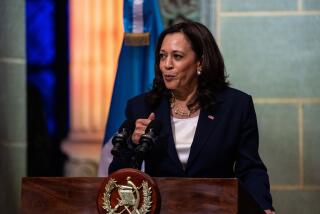War Hype
- Share via
The situation in Central America requires clear thinking and sober judgment, not the hysteria, hyperbole and hype that the White House, the State Department and the Pentagon once again have brought into play.
There is a difference, and a very important difference, between “a major invasion” and an incursion by foreign troops in search of guerrilla forces operating across an international frontier. But the Reagan Administration has deliberately portrayed the military action on the Honduras-Nicaragua frontier for what it was not.
With arrogance, Americans in Tegucigalpa and Washington have dismissed the wish of the government of Honduras to play down the events and have pressured Honduras to issue a call for help when there is no evidence that help was needed. The President sent $20 million, which Honduras said it never asked for, and 14 helicopters, already “on maneuvers” in Honduras, with U.S. crews, to ferry Hondurans into action.
The timing was exquisite, coinciding with the vote in the U.S. Senate on the President’s priority $100-million package for the Nicaraguan contras , waging a guerrilla war against Nicaragua from bases in the south of Honduras. But that seems to have made little difference to senators, increasingly suspicious of the alarms being sounded by the President. There was no roll call on final approval of the aid, but the vote seems to have gone about as had been expected before the latest “crisis.”
These events have raised anew fundamental questions about U.S. policy in Central America.
Reagan’s patronizing dismissal of the wishes of the Honduran government was another in a long series of assertions that “Uncle Sam knows best”--a posture that has undermined the Contadora peace effort of the Latin Americans themselves. All Latin America must have appreciated the delicacy of the Honduran response, as President Jose Azcona Hoyo flew off for a beach vacation.
The use of American flight crews and helicopters to fly Honduran troops into battle positions calls for prompt explanation to Congress and implementation of the War Powers Act. Joint U.S.-Honduran maneuvers have been approved in the past to discourage expansionism by the Nicaraguans. But Congress has never approved the deployment of American servicemen to defend the guerrillas and their clandestine bases.
The bellicose response by the United States has also served to divert attention from the responsibility of the Sandinista rulers of Nicaragua. They may claim a right of hot pursuit of guerrillas. The border is ill-defined and rugged. But none of those factors can excuse the action. It must rank as one of Nicaragua’s grossest blunders--a defiance of the Contadora efforts to negotiate, not shoot, the way to a settlement. Managua’s credibility was further damaged by its insistence that there had been no incursion. But at least that transparent falsehood was accompanied by a constructive proposal: to proceed with Contadora sponsorship of a bilateral border commission to try to control the Honduras-Nicaragua border just as a recently established commission is doing on the Costa Rica-Nicaragua frontier.
The manipulation of information to squeeze congressional votes here and there only defers articulation of a coherent U.S. policy. That policy can be meaningful only if it respects the wishes of the Latin Americans and trusts their ability to follow the path to peace already charted by the Contadora powers.
More to Read
Sign up for Essential California
The most important California stories and recommendations in your inbox every morning.
You may occasionally receive promotional content from the Los Angeles Times.













